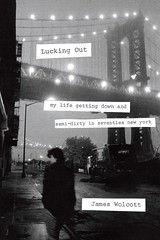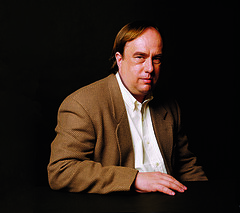Luckily for East Villagers, James Wolcott’s memoir of his days as a young culture critic in a now nearly vanished city, “Lucking Out: My Life Getting Down and Semi-Dirty in Seventies New York,” places much of its meat and potatoes (along with plenty of gravy) right here in our very own backyard. Steering a middle course between the sometimes overly concentrated, every-word-counts prose of his Vanity Fair columns, and the more loosey-goosey style he deploys in his blog at the same publication, Mr. Wolcott reconfirms his position as New York’s wittiest critic.
Despite its pleasing portability (the book, out later this month, comes in at about 270 pages), “Lucking Out” covers plenty of ground, bopping from Mr. Wolcott’s mice-ridden “man-cave” on East 12th Street, down to CBGB, and back up to the Village Voice, where he made his name. It slides west for a gawk at the gay heyday of the West Village, then uptown for some quality time among the balletomanes of Lincoln Center (with a pause for skuzzy “Taxi Driver”-era Times Square porn along the way), and includes countless screening room séances with his mentor and muse, the late New Yorker film critic, Pauline Kael, to whom large portions of the book can be seen as an extended and touching valentine.
Like memories of the Algonquin’s wits in the 1920s, and the Beats’ shenanigans in the ‘50s, writing about New York’s early punk scene has devolved (as Mr. Wolcott points out) from legend into self-perpetuating lore. But as an eye-witness to the “East Village cockroach kingdom,” Mr. Wolcott brings alive the long, sweaty nights in the “Arabian heat” of CBGB.
Take this mini-portrait of an ambitious young songstress named Patti Smith, circa 1975: “What Madonna would master and Lady Gaga after her would embellish into jeweled armor, Patti Smith flashed like a blade: the crowned awareness that to become a true star is to act like a star from the moment of self-conception and let the world play catch-up. Even when chewing gum, she seemed to be chewing it for the ages.” If it’s possible to write a sentence about someone chewing gum for the ages that is itself for the ages, I think that’s it.
Mr. Wolcott is more circumspect when it comes to describing his literary peers, occasionally resorting to discreet initials, or letting fly when the coast is clear: “[Harold] Brodkey is gone now, the monumental presence he thought he was permanently casting eaten by sunlight,” he writes of the New Yorker’s Proustian in-house novelist. But his portraiture of the CBGB regulars – Tom Verlaine, Debbie Harry, Richard Hell, Tina Weymouth, Lenny Kaye, Lou Reed, John Cale, the Ramones, the Dead Boys, et al (even Norman Mailer puts in an appearance, raving about the Ramones) – is a continuous delight. David Byrne is described as having “the demeanor of someone who has spent the last half hour whirling around in the spin drier,” and the bit players and audience members get a democratically generous allotment of space as well.
Of course, Patti Smith never did become a “true star,” certainly not on the level of those who came before or after her, and the same holds for almost all the bands at CBGB as well as the ferociously self-serious intellectuals – Robert Christgau, Ron Rosenbaum, Ellen Willis, Richard Goldstein, et al. – at the Voice. Some are forgotten, others are still at play in the backlit fields of the Internet, but almost all retain a distinctly parochial flavor, as if trapped in a continuously updated time-loop of Woody Allen’s “Manhattan,” with the laugh-lines methodically removed by ever more busy censors.
If Mr. Wolcott traces the rise and fall of CBGB with the sure hand of a master, he is less convincing when analyzing the intellectual status of his own generation of downtown critics. Willis, Goldstein, and Christgau had “the brains, the ambition, the range and grasp to inherit the big desks in the editorial offices and give culture its marching orders,” but they never did. Well, thank God they didn’t is one’s first reaction, and the second (having read these people) is, “Really?” Here Mr. Wolcott’s usual genius for metaphor turns escapist as he avoids thinking hard about why it didn’t happen: “Ice formed on the ceiling, the elevator got stuck between floors, they were no match for Harvard – choose your own metaphor.” Or maybe they just weren’t Edmund Wilson.
“Lucking Out” is intelligently nostalgic, but it is also, as Mr. Wolcott makes plain, a record of unfulfilled promise, failure, and untimely drug-dealt deaths. AIDS had already begun its devastating work, coursing its way through the arts scene high and low; the intellectual stars of the Voice who thought they were going to take over never did; and bands like Television who had set downtown Manhattan ablaze were ritually showered with beer bottles and abuse when they dared to venture off the island to open for established stadium rockers like Peter Gabriel. Most Americans, it turned out, preferred chunkier British punk rockers like the Sex Pistols, the Clash, and the Damned, not to mention Elvis Costello. CBGB may have ruled Manhattan, but Britannia ended up ruling the waves.
Replete with echoes of a more “media-sparse” world, when people could “still hear the tick-tock beneath their own thoughts,” and business of all kinds was conducted face-to-face rather than on distant computer screens – making us wonder exactly how much we have gained as opposed to given up in the intervening decades – “Lucking Out” is in many ways not only a bitter-sweet but at times a downright melancholy evocation of a low, oddly honest decade when artists still had just enough time to hone their craft in front of devoted audiences before the media hit and forced them to assume a prematurely camera-ready profile. Any other ‘70s memoirists out there will have a hard time topping it.





